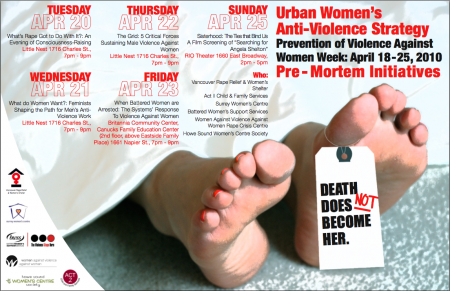STORY about SolidarityGender posted on April 21, 2010 by fazeelajiwa
Death Does Not Become Her: The First Night
Last night, the Urban Women’s Anti-Violence Strategy hosted the first discussion in a series of events this week. The unprecedented coalition includes rape crisis centres, transition houses, second stage houses, and women’s centres from around the lower mainland who have joined together to criticize the Solicitor General’s Domestic Violence Action Plan for focusing the province’s resources on risk assessment and a death review panel, after the violence has already occurred. The Urban Women’s Anti-Violence Strategy calls for recognition of the essential role that independent and equality seeking women’s organizations play in ending the systemic inequalities that perpetuate violence against women.
Last night’s event was named “What’s Rape Got to Do With It? An Evening of Consciousness Raising.” When participants walked into the cozy café, we were greeted with a quote from Kathie Sarachild, one of the women who termed “consciousness raising” as a radical weapon that enables oppressed groups to gain a shared awareness of the societal norms and institutions that shape lived experiences. It read “knowing how our lives related to the general condition of women would make us better fighters on behalf of women as a whole. We felt that all women would have to see the fight of women as their own, not as something just to help other women, that they would have to see this truth about their own lives before they would fight in a radical way for anyone.”
Throughout the night we discussed questions that addressed racial stereotypes, the male sexual gaze, cosmetics, and feminism among other things. It was apparent to my group that rape had a lot to do with it, with everything – and that it was rare to have the opportunity to talk about it with other women. Elena Alvarez, a participant, was heartened that she could see “similarities in the way we feel. Talking about it makes you think you’re not crazy, and you’re not the only one.” There was also one group of men who answered a different set of questions with each other. John Clements said that it was “rare and unique to get a group of men together to talk about this stuff” and D’Arcy Pocklington added that the experience of “talking about the development of my emotional life was cathartic and relieving.”
So what has rape got to do with it? Rape crisis workers can tell you that most rapists are men that women know, including our common-law or married partners, and that in Canada, one in three women are subject to sexual violence in their lifetimes. Despite that indication of the prevalence of rape, rape in marriage only became a criminal offence in 1983 – before that, the marriage contract was said to imply consent to sex. The coercive and violent act of rape is often a fundamental aspect of domestic abuse, but the Solicitor General’s Action Plan does not address sexual violence.
One of the organizers of last night’s event, Daisy Kler from the collective of Vancouver Rape Relief and Women’s Shelter, explained why the Urban Women’s Anti-Violence Strategy chose to bring the subject of rape to the public: “Rape is not on the public agenda, and certainly not in terms of making social policy. We thought that starting the public conversation from the roots of the problems that women face (in the radical tradition of consciousness raising) would allow us to reveal to each other that rape is a product and a reflection of women’s inequality.” Any amount of risk assessment training that the domestic violence action plan can offer professionals like police or social workers cannot replace the work of feminist, equality seeking rape crisis services and transition houses. At best, this action plan is a useful reform in that it addresses the inconsistent policies and procedures of different professional groups that deal with domestic violence. It is not, however, a social transformation of the entrenched power hierarchies between men and women that reinforce male violence against women – which is the goal of women’s groups like those in the Urban Women’s Anti-Violence Strategy, and it is why these groups demand to be involved with and funded by the province’s plans to address violence.
After soul-searching, we all got to ponder the question “what do you expect from the women’s movement?” Laura Holland from the Aboriginal Women’s Action Network answered “That we get to treat each other with dignity, like we are all human beings. By myself I can’t stop this violence from happening to someone’s daughter or sister or mother or aunty every minute of every day. But I can continue this conversation with my friends and my brothers. We start the revolution here.”
Fazeela Jiwa is an independent journalist that also works with VRRWS.
The site for the Vancouver local of The Media Co-op has been archived and will no longer be updated. Please visit the main Media Co-op website to learn more about the organization.

Comments
How about a full-sized image
How about a full-sized image in stead of the thumbnail?